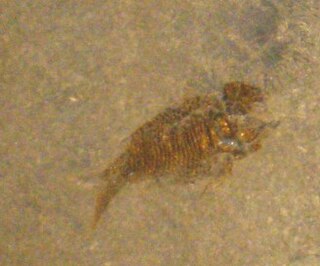Zeuchthiscus is a genus of prehistoric ray finned fish that lived in Australia during the Early Triassic Period. It is believed to have been a nektonic omnivore. Closely related fish had a wide distribution in the northern hemisphere.

Porolepiformes is an order of prehistoric lobe-finned fish which lived during the Devonian period. They are thought to represent the sister group to lungfish. The group contains two families: Holoptychiidae and Porolepididae.
Elopopsis is an extinct genus of prehistoric bony fish that lived from the Cenomanian to Campanian.
Enischorhynchus is an extinct genus of prehistoric bony fish that lived during the Turonian of southern Texas.
Mesoclupea showchangensis is an extinct ichthyodectiform ray-finned fish that lived in freshwater environments in what is now China during the Early Cretaceous epoch. It differs from its sister genus, Chuhsiungichthys, primarily by having a more posteriorly-placed dorsal fin.
Chrysolepis is a genus of prehistoric marine lobe-finned fish that lived during the Late Devonian period. It contains a single species, C. orlensis, known from the middle Famennian of Oryol Oblast, Russia. It is the only member of the family Chrysolepididae, erected due to its highly distinct morphology unseen among other osteolepiforms. It may be the sister taxon to the eusthenopterids.
Agecephalichthys is an extinct genus of prehistoric freshwater "palaeonisciform" ray-finned fish that lived during the Anisian age. It contains a single species, A. granulatus from the Hawkesbury Sandstone in what is now New South Wales, Australia.
Inichthys is an extinct genus of prehistoric marine bony fish that lived during the Lopingian epoch. Fossils were recovered in the Kuznetsk Basin, European Russia.
Trachelacanthus is an extinct genus of prehistoric bony fish that lived during the Late Permian epoch.

Euthynotus is an extinct genus of prehistoric bony fish that lived during the early Toarcian stage of the Early Jurassic epoch. It is generally considered the basalmost pachycormiform.
Cephaloxenus is an extinct genus of prehistoric marine ray-finned fish that lived during the early Ladinian stage of the Middle Triassic epoch.
Egertonia is an extinct genus of prehistoric bony fish. The earliest occurrences of the genus in the fossil record are from the Late Cretaceous of Madagascar and India.
Eigilia is an extinct genus of prehistoric bony fish that lived during the Roadian age in what is now Kazakhstan.
Kentuckia is an extinct genus of prehistoric bony fish.
Korutichthys is an extinct genus of prehistoric marine bony fish that lived during the Lopingian epoch in what is now Krasnoyarsk Krai, Russia. It was first referred to the family Amblypteridae, a view that was later questioned.
Igornella is an extinct genus of prehistoric bony fish that lived during the Gzhelian (Stephanian) to Asselian ages in what is now France (Burgundy).

Tarasiiformes is an extinct order of prehistoric ray-finned fish.

Peltopleuridae were an extinct family of prehistoric bony fish. It is classified with the order Peltopleuriformes.

Thoracopteridae is an extinct family of prehistoric bony fish classified with the order Peltopleuriformes, containing four genera: Thoracopterus, Gigantopterus, Potanichthys and Italopterus. This lineage of Triassic flying fish-like Perleidiformes converted their pectoral and pelvic fins into broad wings very similar to those of their modern counterparts. However, this group is not related to modern flying fish from the family Exocoetidae, instead being a case of convergent evolution.




